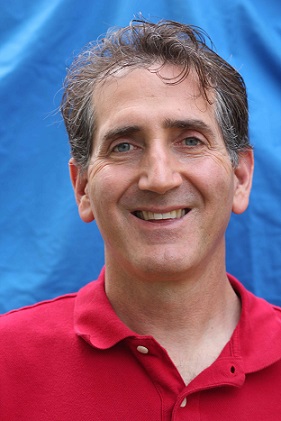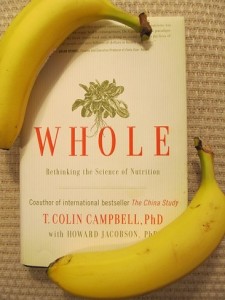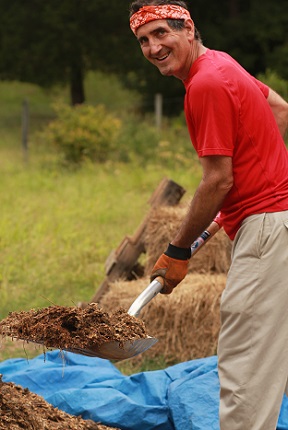
Howard Jacobson talks about the writing of Whole and his next steps in guiding people to reconnect with nature
Howard Jacobson Shares What It’s Like to Work With Dr. Campbell and What the Next Step Might Be
Whole, Dr. T Colin Campbell’s ground breaking book, tells why we need to totally rethink the science of what we eat. This subject could be confusing, unapproachable, or dull for most people. It’s none of these things, in large part thanks to Howard Jacobson, PhD, who is a contributing author of this compelling paradigm changer.
Every time I read Whole, quote after quote leaps out to tell the story with powerful language and images not afraid to tell the truth. Here are a few examples:
“We “race for the cure” by pouring billions of dollars into dangerous and ineffective treatments. We seek new genes, as if the ones we’ve evolved over millions of years are insufficient for our needs. We medicate ourselves with toxic concoctions, a small number of which treat the disease, while the rest treat the harmful side effects of the primary drugs.”
“Evolution has thankfully programmed us to seek out and enjoy foods that promote our health. All we have to do is get back to our dietary roots – nothing radical or miserable required.”
“Just eat lots of different plant foods; your body will do the math for you!”
This last quote is one of my favorites, and I use it in almost all my presentations. Ever since reading
Whole, I’ve wanted to learn more about the process of writing it, and was delighted to have a chance to talk with Howard Jacobson. He shared what it was like to work with Dr. Campbell, how he got the opportunity, and what’s next for him.
As a child, Howard grew up on a home-cooked version of the standard American diet. He begged his mom for white bread and TV dinners. “Ironically, now I want people to wrest back control of their food from the big industries that control our diet,” he observed.
Howard has taken control of his own diet by moving to a farm and growing as much of his food as possible. “I try to live out of my garden, which now is thick with tomatoes, okra, and berries. I round this out with foods like potatoes, rice, quinoa, and some processed foods, especially pasta. I even eat fries about once a month. My diet is 97% whole plant foods, right where I want to be. I’m trying to take
the emotion out of eating and make informed choices. Yes, I can get 45 seconds of pleasure from a cookie, but I know I’ll feel bad much longer after that. I do enjoy the way I eat – pure denial would not last long for me. I stay away from foods that make me feel bad right away.”
I asked Howard how he got the chance to coauthor Whole. He told me a story that had several turns and was not planned. “I first met Dr. Campbell at a VegSource conference in 2004. When The China Study was published the next year, I wrote one of the first Amazon reviews. The way Amazon works is
that the early reviews tend to help the most potential readers and so stay at the top of the review list. So when reviews friendly to the meat industry started bashing the book, my five-star review edged in ahead of all of them. One day I was amazed that Dr. Campbell called me to thank me for the review. I have no idea how he even got my number. I ended up visiting him during a summer trip with my family, and we stayed in touch. One day he called me again about a manuscript that needed help. I hesitated, but then said yes just for a chance to work with him. It started out as a minor editing project but kept expanding. Dr. Campbell was the one who took the initiative to make me a contributing author.”
Howard shared the experience of working with Dr. Campbell. “He is honorable, honest, ethical, and kind. He does not have a hidden agenda or fixed ideas. He always looks at a new study with an open mind – he does not automatically spring into action to debunk it. In fact, he wants to see the value in research, and is disappointed when it becomes apparent the study has major flaws. He is a scientist, first and foremost. He is always rethinking what he knows, and has thousands of presentations that he’s prepared. If he had just wanted money, he would have shut up early in his career and just taken all the big agriculture money that was waiting for him. As I worked with him, the biggest challenge was to see the world the way he did. Once I learned the astonishing facts he was wanting to share, and

Howard advocates urban agriculture as a wonderful way to connect with the earth and regain control of the food supply
could see science through his eyes, the book flowed from there. The main story is the simplicity beyond the complexity.”
I asked Howard about his next project. “It might at some point be a book. I have a book in me, a radical book not just on food, but on our civilization. We have lost our connection with the earth and need to replant ourselves. Urban agriculture is a growing movement and will be important as part of the solution of how people can thrive in cities and suburbs.”
For now, Howard is a marketing consultant, helping others get their ideas put into practice. He has a unique podcast site (also on Facebook) and gives many presentations, teaching people the lessons of Whole and how to make a plant-based, sustainable diet work for them. I’ll be on the lookout to hear him whenever I can.
If you enjoyed this post, you may want to check out some whole foods, plant-based recipe ideas so you can enjoy the foods your body is designed for.
Intrigued? Now you can use our Whole Foods Blog Finder to target informative, fun postings on whole foods, plant-based diets. Quick information at no cost!
Blog posting by Janice Stanger, Ph.D. Janice authored The Perfect Formula Diet: How to Lose Weight and Get Healthy Now With Six Kinds of Whole Foods, a book that shows you how to maximize the benefits of a whole foods, plant-based diet.
Tags: Dr. T. Colin Campbell, Howard Jacobson, urban agriculture, Whole, whole foods plant-based diet






